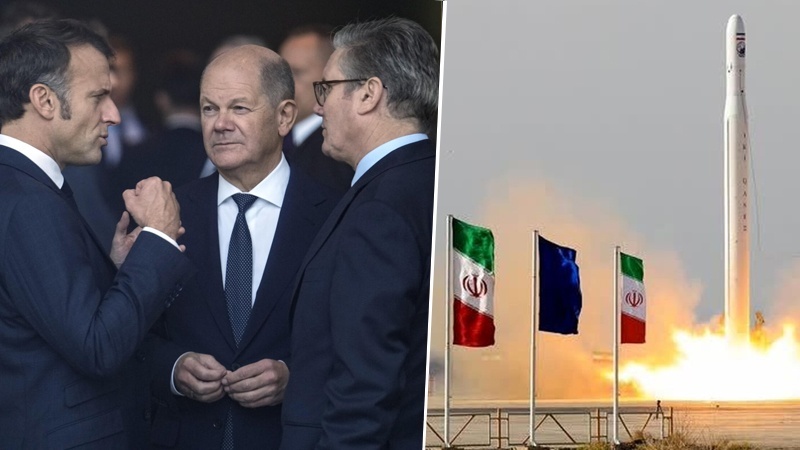In recent months, the behavior and positions of Europe and the United States have shown a completely confrontational policy towards the Islamic Republic of Iran. According to Sobh-e-No newspaper, while Iran has repeatedly emphasized that it is seeking to reduce tensions and resolve conflicts, Western parties have not only failed to respond positively to these efforts, but have also continued to increase pressure and threats.
Iran has announced to the international community over the past years that its nuclear activities are peaceful and that there is no deviation towards building nuclear weapons in its program. In addition, the Islamic Republic has repeatedly completely rejected the claim of sending weapons to Ukraine.
Despite these clear positions, Western countries continue to pursue a policy of pressure and threat, as if they are taking advantage of Iran's cooperation and instead of creating a space for dialogue, they are seeking to create tension.
The efforts of the European troika to issue a resolution against Iran
The meeting of the Board of Governors of the International Atomic Energy Agency, which is scheduled to review Iran's nuclear program and the level of cooperation with the agency, started in Vienna. The UK, Germany, and France have distributed a draft resolution against the Islamic Republic among members. This text shows the Europeans' serious decision to increase pressure on Iran.
Mohammad Eslami, the head of the Atomic Energy Organization of Iran, warned explicitly at a joint press conference with the Director-General of the International Atomic Energy Agency: "If European countries choose the path of confrontation and issue a resolution against Iran, we will take action immediately and reciprocally."
The West; demanding commitments that it has violated itself
Despite the US withdrawal from the JCPOA and Europe's breach of promise, Iran has tried in recent years to remain committed to its obligations as much as possible and to show its goodwill to the international community; but the West has chosen the path of threat and sanctions instead of responding to this goodwill.
The need for Iran to make a decisive decision
In this situation, some analysts believe that Iran should make a decisive decision in the face of these threats. Kamal Kharrazi, the head of Iran’s Strategic Council on Foreign Relations, had previously mentioned in an interview that during the period of threat, Iran may change its defense doctrine.
Iran can increase the level of uranium enrichment and reduce its cooperation with the agency to a minimum in response to Western behavior. As Kharazi mentioned, the period of threat is the best time to make important and irreversible decisions.
An opportunity to determine the fate of Iran's nuclear program
Some experts also believe that now is the best time for Iran to take its nuclear program to a point where it is no longer possible to return to the past.
The behavior and statements of Iranian officials in recent days indicate that Iran is ready to respond to any threat and resolution against itself. Reducing cooperation with the agency, reducing the level of inspections, and even increasing uranium enrichment are among the actions that may be on Iran's agenda.
This situation shows that although Iran is still seeking cooperation and resolving issues through dialogue, the West's confrontational behavior has weakened the space for dialogue and forced Iran to make decisive decisions.
Increase of EU sanctions; another example of hostile behavior against Iran
On Monday, November 18, the European Union Council announced in a statement that the foreign ministers of European countries had decided to expand restrictive measures against Iran.
This decision, which was made under the pretext of Iran's military support for Russia in the Ukraine war and its alleged support for armed groups in West Asia and the Red Sea, is another example of Europe's hostile behavior against the Islamic Republic of Iran.
New sanctions and targeting Iran's defense industries
Based on this decision, sanctions have been imposed on the use of ships and ports for the transfer of drones, missiles, and related technologies. The European Union has also banned the export, transfer, supply, or sale of components used in the development and production of Iranian missiles and drones.
This decision, which directly targets Iran's defense industries and strategic capabilities, shows the European countries' efforts to limit Iran's capabilities in the field of advanced defense technologies. This action is taking place while the European Union has not provided any specific and documented evidence for its claims about Iran's military support for the Ukraine war.
Sanctions; a tool for pressure and threat instead of cooperation
The European Union's recent action can be seen as a clear example of the instrumental use of sanctions to pressure Iran. Europe, which has not fulfilled its obligations under the JCPOA and has only limited itself to issuing symbolic statements, is now seeking to deter Iran from developing its defense technologies by expanding sanctions.
In response, Iran has repeatedly stated that such sanctions have
never had a significant impact on its strategic programs, and the
Islamic Republic will continue to develop its defense capabilities.
/129

